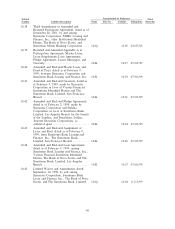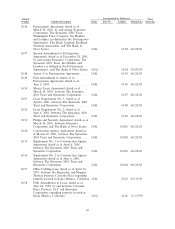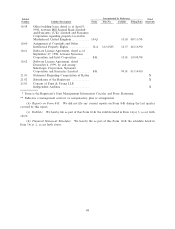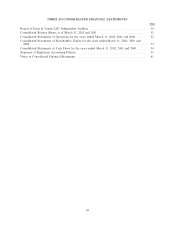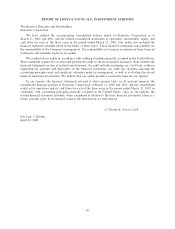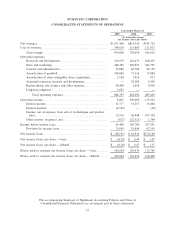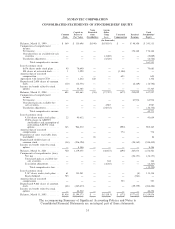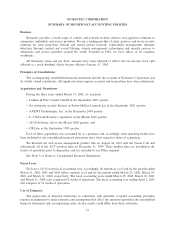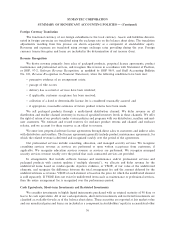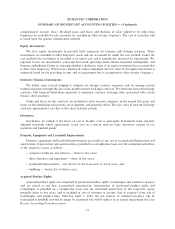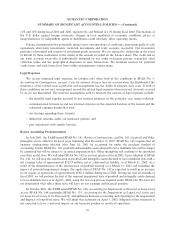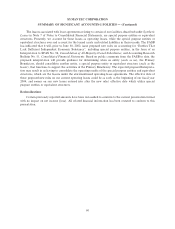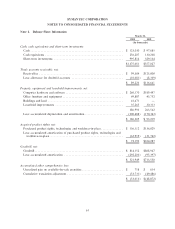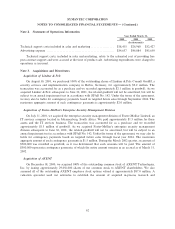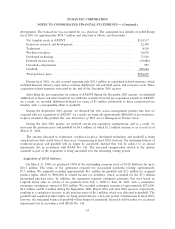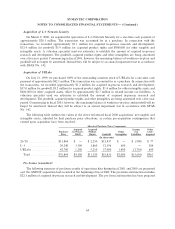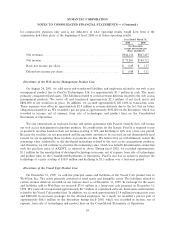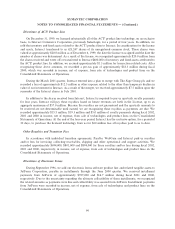Symantec 2002 Annual Report Download - page 78
Download and view the complete annual report
Please find page 78 of the 2002 Symantec annual report below. You can navigate through the pages in the report by either clicking on the pages listed below, or by using the keyword search tool below to find specific information within the annual report.SYMANTEC CORPORATION
SUMMARY OF SIGNIFICANT ACCOUNTING POLICIES Ì (Continued)
Foreign Currency Translation
The functional currency of our foreign subsidiaries is the local currency. Assets and liabilities denomi-
nated in foreign currencies are translated using the exchange rate on the balance sheet dates. The translation
adjustments resulting from this process are shown separately as a component of stockholders' equity.
Revenues and expenses are translated using average exchange rates prevailing during the year. Foreign
currency transaction gains and losses are included in the determination of net income (loss).
Revenue Recognition
We derive revenue primarily from sales of packaged products, perpetual license agreements, product
maintenance and professional services, and recognize this revenue in accordance with Statement of Position,
or SOP, 97-2, Software Revenue Recognition, as modiÑed by SOP 98-9, and StaÅ Accounting Bulletin
No. 101, Revenue Recognition in Financial Statements, when the following conditions have been met:
‚ persuasive evidence of an arrangement exists;
‚ passage of title occurs;
‚ delivery has occurred or services have been rendered;
‚ if applicable, customer acceptance has been received;
‚ collection of a Ñxed or determinable license fee is considered reasonably assured; and
‚ if appropriate, reasonable estimates of future product returns have been made.
We sell packaged products through a multi-tiered distribution channel. We defer revenue on all
distribution and reseller channel inventory in excess of speciÑed inventory levels in these channels. We oÅer
the right of return of our products under various policies and programs with our distributors, resellers and end-
user customers. We estimate and record reserves for end-user product returns and channel and end-user
rebates, and we account for these reserves as an oÅset to revenue.
We enter into perpetual software license agreements through direct sales to customers and indirect sales
with distributors and resellers. The license agreements generally include product maintenance agreements, for
which the related revenue is deferred and recognized ratably over the period of the agreements.
Our professional services include consulting, education, and managed security services. We recognize
consulting services revenue as services are performed or upon written acceptance from customers, if
applicable. We recognize education services revenue as services are performed. We recognize managed
security services revenue ratably over the period that such contracted services are provided.
In arrangements that include software licenses and maintenance and/or professional services and
packaged products with content updates (""multiple elements''), we allocate and defer revenue for the
undelivered items based on vendor-speciÑc objective evidence, or VSOE, of fair value of the undelivered
elements, and recognize the diÅerence between the total arrangement fee and the amount deferred for the
undelivered items as revenue. VSOE of each element is based on the price for which the undelivered element
is sold separately. If VSOE does not exist for undelivered items such as maintenance or professional services,
then the entire arrangement fee is recognized over the performance period.
Cash Equivalents, Short-term Investments and Restricted Investments
We consider investments in highly liquid instruments purchased with an original maturity of 90 days or
less to be cash equivalents. All of our cash equivalents, short-term investments and restricted investments are
classiÑed as available-for-sale as of the balance sheet dates. These securities are reported at fair market value
and any unrealized gains and losses are included as a component in stockholders' equity in accumulated other
56


